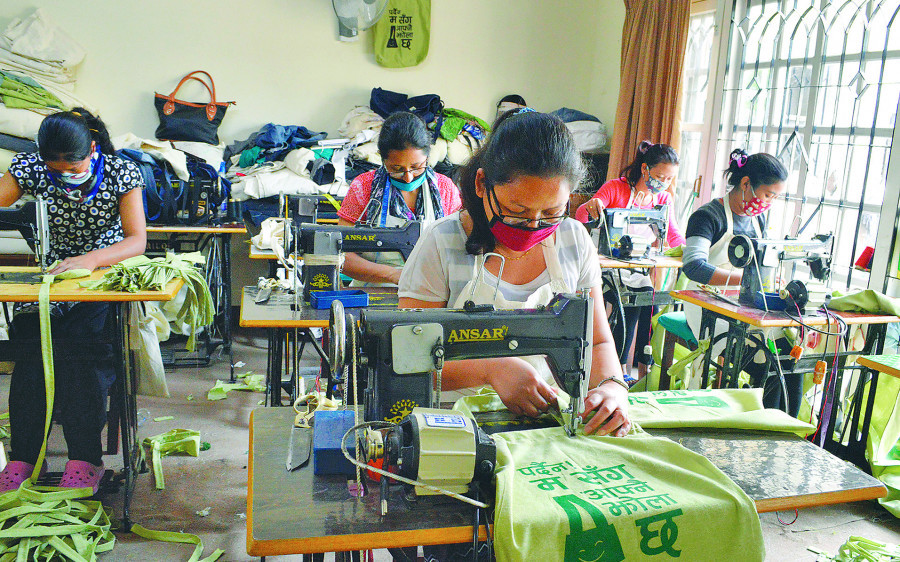Columns
Helping women in business
Women entrepreneurs lack technical knowledge to expand their business operations.
Roshee Lamichhane
Of late, women-led enterprises are picking up in numbers across all seven provinces of Nepal. My observations from a recent trip to Gorkha and Lamjung (Ghalegaun) validate the statistics. In fact, one-third of business ventures are led by women. This piece is based on my interactions with female entrepreneurs at the Federation of Women Entrepreneurs' Associations of Nepal (FWEAN) in Gorkha and those running homestay businesses in Ghalegaun, Lamjung. It is also based on a workshop organised on scaling up business ventures with women entrepreneurs from Lalitpur Metropolitan City. They run several kinds of businesses, including eateries, boutiques, parlours, clothing, wholesale and retail, handmade boxes, jewellery, printing presses, toiletries, bee-keeping, incense candles and agriculture. The absence of properly formulated strategies for scaling up their businesses significantly surfaced as the major hindrance among several other challenges plaguing female entrepreneurs.
Potential barriers
Women entrepreneurs are found to be mostly lacking technical knowledge to expand their business operations. Most of them continue to face challenges due to increasing competition. Many of these women-run small and medium enterprises (SMEs) face financial hurdles. Moreover, they are also found to be ignorant of the causative factors that keep their businesses stagnant even before their ventures reach the stage of expansion. Faced with the challenge of stagnant business, women entrepreneurs generally tend to toy with the idea of closing down their operations or continuing in the current mode. Whenever their businesses experience financial difficulties, they do not find the right mentors to talk to so that they receive viable ideas to salvage their ventures. They don't have any idea about business research, and they don't look for ways to make their businesses sustainable. They assume that customers have gone over to their competitors and they have to live with it.
Moreover, many women entrepreneurs have no idea about activities associated with successful marketing. Some clothing manufacturers tend to make the mistake of using names of established global brands such as Adidas, Nike and Puma. They have a false notion that using such names represents superior quality and will boost sales. However, they are unaware of the consequences of copyright and trademark violation and infringement. Female entrepreneurs are equally unaware about branding. Collective branding, if practised and implemented, would help such entrepreneurs. This is especially so for those engaged in businesses such as making pickles, baking cakes and raising bees.
Given the scale of their operations and lack of knowledge and the right usage of digital platforms, women miss out on opportunities to scale up their businesses. In general, women are unaware of the policies that support women-led ventures while others find them full of procedural hassles.
Things to do
Women entrepreneurs across the world face serious and contentious issues. There are several initiatives worldwide to support women entrepreneurs to access finance, find mentors, balance home and family, conduct collective branding initiatives and so forth. The United Nations Conference on Trade and Development (UNCTAD) also has a programme to support women in business by showcasing stories of struggle and failure, and how women pressed on through such turbulent times. Such stories would be examples of how women, while overcoming gender stereotypes, support each other for socially meaningful businesses.
One possible way to help female entrepreneurs scale up their businesses is launching information campaigns. But before doing so, it is important to categorise the needs of the entrepreneurs. While some entrepreneurs are certain about the need to expand their business, others are unsure and would like to remain as they are. Hence, the necessity for expansion should be explained to them only after assessing their desires. Towards this end, information can be disseminated through the existing structures such as the FWEAN, Federation of Nepalese Chambers of Commerce and Industry and Federation of Nepali Cottage and Small Industries. Using these platforms, they can organise regular programmes on digital literacy, access to finance, marketing and branding. Also, such programmes should be made more regular at the provincial and local levels, and the requisite budget should be allocated beforehand. It is disheartening that entrepreneurs at the local level are clueless about the yearly activities and support provided by the government. Women entrepreneurs can be expected to be motivated to give their best should plans and policies be put in place beforehand.
Second, the current policies of the government and support mechanisms are not directed at and specific to SMEs. Most women-led ventures are SMEs, and the government should devise mechanisms to support them in particular. Appropriate incentive mechanisms should be devised and special preference accorded to products made in Nepal and organic products.
Third, digitalisation at best is only an enabler for any kind of business. This is particularly so for women-specific businesses, as going digital saves time and supports their marketing and branding activities. In addition, the concept of group entrepreneurship and collective branding should be promoted as most female entrepreneurs think spending on branding initiatives doesn’t make business sense. They would do well to conduct branding initiatives on a cooperative basis, both on online and offline platforms. After all, collective branding is always a cheaper and more efficient way to promote business.




 9.6°C Kathmandu
9.6°C Kathmandu.jpg)















